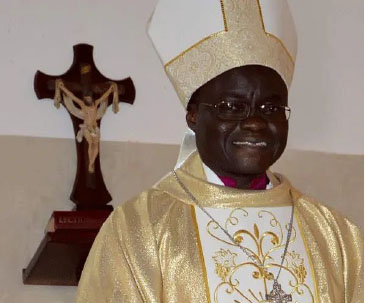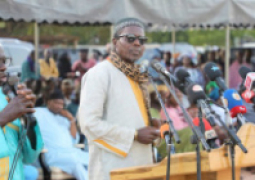
The birth of Christ was the fulfilment of God’s promise to save humanity from sin and death and restore our dignity as children of God. Our celebration of his birth is, therefore, a celebration of God’s fulfilment of his promise at the fullness of time because his birth fulfilled God’s promise. God was, therefore, the one who determined the location, time, and circumstance of Christ’s birth before he was born. St. Luke alluded to this in his account of the birth of Christ in Lk. 2:1-7. He said in 2:6 that “it was while they were there in Bethlehem, the City of David that the time came for Mary to have her child and she gave birth to her first-born son and wrapped him in swaddling cloths.” This indicates that the place and time Jesus was born was not St. Joseph’s or Mary’s choice of preference. It was God’s own favorable time in accordance with his plan. So my Christmas message to you my dear friends in Christ, our Muslim brothers and sisters, and other believers is on God’s appointed time, God’s favorable time for us, and our submission to his plans for us like Mary, the Mother of our Savior Jesus Christ.
When Mary willingly accepted God’s plan to become the Mother of our Savior, she identified herself as the handmaid of the Lord who was open to God’s will. She said in Lk. 1:38, “I am the handmaid of the Lord, so let it be done to me according to God’s word.” Mary was completely disposed to surrender herself to God and allow God’s will to be done in her life. So whatever God decided and requested was perfectly acceptable to her. She was not, therefore, concerned about God’s ways, his unpredictable actions and demands, and her limitation to fulfill God’s plan and will. Her singular goal as the handmaid of the Lord was simply to obey God’s word and allow his will to be done in her life according to his plan. So Mary clearly understood that she cannot determine God’s plan for her and she proved it in Jn. 2:5 when she made her request to Jesus at the wedding feast in Cana. She simply presented her request and then instructed the servants to do whatever Jesus tells them to do. There was no definitive decision, on her part, on what Jesus should do at that moment. She was, therefore, open, patient, and willing in both cases to cooperate with God’s will for her as the Mother of Jesus. We too should imitate Mary’s noble example of obedience and total surrender to God and allow his plans to be fulfilled in us at his own appointed time.
Since the prophets in the Old Testament, God promised his chosen people a messiah and a savior who will save them from their political and religious enemies, restore their freedom, and govern them with integrity and justice. He also informed them of the messiah’s family lineage, identity, and sovereignty and assured them of his faithfulness and commitment to his promise. The savior of God’s chosen people was, therefore, highly expected throughout the Old Testament so they were hopeful that God will fulfill his promise to them in their own day and age. But it was only in the fullness of time that God finally fulfilled his promise of the messiah. Their long awaited messiah and savior was not sent at the time God promised them; when they were still living in exile and suffering oppression from their enemies. He was not sent when they wanted God to fulfill his solemn promise. Their messiah and savior was only born and sent at the fullness of time which God alone determined in his own wisdom. And the exact moment God fulfilled his promise was what Luke specified in 2:6 that “the time came for Mary to have her child and she gave birth to her first-born son.” This was also confirmed by St. Paul in Gal. 4:4 that “in the fullness of time God sent his Son born of a woman, born subject of the Law, in order to, redeem the subjects of the Law.”
Our celebration of Christmas is, therefore a celebration of the birth of the Son of God and our Savior Jesus Christ and also a celebration of God’s direct intervention in our human history at the fullness of time. These divine mysteries, events, and activities of God are what we are celebrating today and throughout the Christmas Season. Any other aspect or sense of Christmas is secondary, in that respect, to these two major realities and meaning of Christmas. Today was when the Son of God and our Savior Jesus Christ was born of the Virgin Mary in Bethlehem and became like us in all things but sin. So we are rightly celebrating the mystery of the Incarnation, that is, the mystery of God the Son becoming a human person as he was created by God in his image and likeness. Unfortunately, the human person was tainted and corrupted by sin. For that reason, God became a perfect human being in his Son so that we can regain God’s image and likeness in us. But we are also celebrating God’s direct intervention in our human history when he fulfilled his promise at the fullness of time. We should, therefore, remember what God has done for us and the reason he intervened at the appointed time. For Pope St. Leo the Great, “when the designated time came, which God in his deep and impenetrable plan had fixed, God’s Son took the nature of man upon himself, in order to, reconcile man to his Creator.”
Considering St. Luke’s account of the peculiar circumstance of Christ’s birth, we may question why it was the fullness of time for God to intervene than any other time in history. There was chaos, confusion, instability, and displacement of peoples as a result of Emperor Caesar Augustus’ decree for a census of the world. Even Mary and Joseph were stranded and homeless at the time when they were in Bethlehem. But that was the fullness of time and God’s appointed time to act and enable the Virgin Mary to give birth to his Son Jesus, our Lord and Savior. The peculiar circumstance around Christ’s birth was still the right time for God to fulfill his promise of a Savior. He never changed or delayed his decision, in order to, allow more people to witness the birth of Christ nor did he act against his will. In the midst of the chaos at that time was when Jesus was born, in order to, teach us vital lessons on humility, poverty, obedience, and openness to God’s will at every stage of our lives. We should, therefore, be ready for God’s intervention in good or bad times, in ordinary or extraordinary moments of our lives. For, there is always the fullness of time, the appointed time, and favorable time when God intervenes in our lives as individuals and as a community of faith. So we have to discern and dispose ourselves for that appointed time of God’s grace, blessings, and favor. Otherwise, we will miss many good opportunities to receive God’s favors, gifts, and rewards and be disappointed with ourselves.
We should not, therefore, allow ourselves to be distracted by worldly events, hardship, and riches that we fail to recognize what God intends to do for us at the proper time. Nor should we assume that God has isolated himself from us and is no longer in control of the events of the world like in the past. God is still active in our midst as he was in the past and he equally grants us his favors and blessings at the appointed time. The writer of the letter to the Hebrews clearly testified in 1:1-2, that “in various ways God spoke to our ancestors through his prophets but in our own times, he has spoken to us through his Son.” St. Paul also reminds us in 2Cor. 6:2 that, “at the appointed time, God listened to us, on the day of salvation he came to our help. Well now is the acceptable and favorable time, this is the day of salvation.” This indicates that God continues to grant us his favors, blessings, and guidance at the favorable time. We equally have to be patient and recognize these special moments of God’s intervention in our lives. For, God will not disappoint us; he will not deny us what he plans to offer us at the appointed time if we are patient, open, and receptive to his ways. We should, therefore, trust in God like Mary and allow his will to be done in our lives whenever he decides.
As we celebrate Christ’s birth, we equally thank God for fulfilling his promise to us at the fullness of time. We also express our gratitude to God for Jesus, our Savior he sent to live among us as man, to save us from sin and death, and reconcile us with God. Today is, therefore, a day we celebrate in thanksgiving God’s love and goodness for us in Jesus Christ and his favors and blessings in our daily lives. We have all experienced God’s intervention, assistance, and blessings as individuals, a community of faith, and a nation. So we have this opportunity today to sincerely thank God for saving us from evil, preserving our lives during this pandemic, and granting us a peaceful and free presidential election. I therefore, commend everyone who patiently cooperated with God like Mary to accomplish his will for us at the proper time. They include the medical workers, educationists, service men and women, volunteers, election officials, religious leaders, and all presidential candidates who participated in the elections and graciously acknowledged the final results. In a special way, I commend and congratulate His Excellency President Adama Barrow for his reelection and commitment to serve and work for a better Gambia that will promote peace, progress, prosperity, and the welfare of all peoples, regardless of their religion, tribe, culture, background, and gender. As the Catholic Bishop of the Diocese of Banjul, I wish you all, the priests, religious, lay faithful, our brothers and sisters in Christ, Muslim friends, and believers of other faiths, Gambians at home and abroad a very joyful, peaceful, and solemn Christmas celebration.
Your Servant in Christ,
Most Rev. Dr. Gabriel Mendy C.S.Sp.
Catholic Bishop of the Diocese of Banjul, The Gambia.
Read Other Articles In National News





